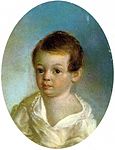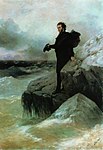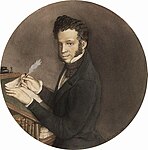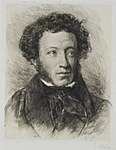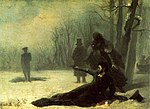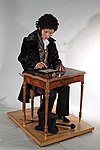
Alexander Pushkin
Alexander Sergeyevich Pushkin[a] (English: /ˈpʊʃkɪn/;[2] Russian: Александр Сергеевич Пушкин, IPA: [ɐlʲɪkˈsandr sʲɪrˈɡʲe(j)ɪvʲɪtɕ ˈpuʂkʲɪn] ; 6 June [O.S. 26 May] 1799 – 10 February [O.S. 29 January] 1837) was a Russian poet, playwright, and novelist of the Romantic era.[3] He is considered by many to be the greatest Russian poet,[4][5][6][7] as well as the founder of modern Russian literature.[8][9]
"Pushkin" redirects here. For other uses, see Pushkin (disambiguation).
Alexander Pushkin
Александр Пушкин
Александр Пушкин
6 June 1799
Moscow, Russian Empire
10 February 1837 (aged 37)
Saint Petersburg, Russian Empire
- Poet
- novelist
- playwright
Russian
- Novel
- novel in verse
- poem
- drama
- short story
- fairytale
4
Pushkin was born into the Russian nobility in Moscow.[10] His father, Sergey Lvovich Pushkin, belonged to an old noble family. One of his maternal great-grandfathers was Major-General Abram Petrovich Gannibal, a nobleman of African origin who was kidnapped from his homeland by the Ottomans, then freed by the Russian Emperor and raised in the Emperor's court household as his godson.
He published his first poem at the age of 15, and was widely recognized by the literary establishment by the time of his graduation from the Tsarskoye Selo Lyceum. Upon graduation from the Lycée, Pushkin recited his controversial poem "Ode to Liberty", one of several that led to his exile by Emperor Alexander I. While under strict surveillance by the Emperor's political police and unable to publish, Pushkin wrote his most famous play, Boris Godunov. His novel in verse Eugene Onegin was serialized between 1825 and 1832. Pushkin was fatally wounded in a duel with his wife's alleged lover and her sister's husband, Georges-Charles de Heeckeren d'Anthès, also known as Dantes-Gekkern, a French officer serving with the Chevalier Guard Regiment.
Early life[edit]
Born in Moscow, Pushkin was entrusted to nursemaids and French tutors, and spoke mostly French until the age of ten. He became acquainted with the Russian language through communication with household serfs and his nanny, Arina Rodionovna, whom he loved dearly and to whom he was more attached than to his own mother.
He published his first poem at the age of 15. When he finished school, as part of the first graduating class of the prestigious Imperial Lyceum in Tsarskoye Selo, near Saint Petersburg, his talent was already widely recognized on the Russian literary scene. At the Lyceum, he was a student of David Mara, known in Russia as David de Boudry, a younger brother of French revolutionary Jean-Paul Marat.[17] After school, Pushkin plunged into the vibrant and raucous intellectual youth culture of St. Petersburg, which was then the capital of the Russian Empire. In 1820, he published his first long poem, Ruslan and Ludmila, with much controversy about its subject and style.
Social activism[edit]
While at the Lyceum, Pushkin was heavily influenced by the Kantian liberal individualist teachings of Alexander Kunitsyn, whom Pushkin would later commemorate in his poem 19 October.[18] Pushkin also immersed himself in the thought of the French Enlightenment, to which he would remain permanently indebted throughout his life, especially Voltaire, whom he described as "the first to follow the new road, and to bring the lamp of philosophy into the dark archives of history".[19][20]
Pushkin gradually became committed to social reform, and emerged as a spokesman for literary radicals. That angered the government and led to his transfer from the capital in May 1820.[21] He went to the Caucasus and to Crimea and then to Kamianka and Chișinău in Bessarabia, where he became a Freemason.
He joined the Filiki Eteria, a secret organization whose purpose was to overthrow Ottoman rule in Greece and establish an independent Greek state. He was inspired by the Greek Revolution and when the war against the Ottoman Empire broke out, he kept a diary recording the events of the national uprising.
